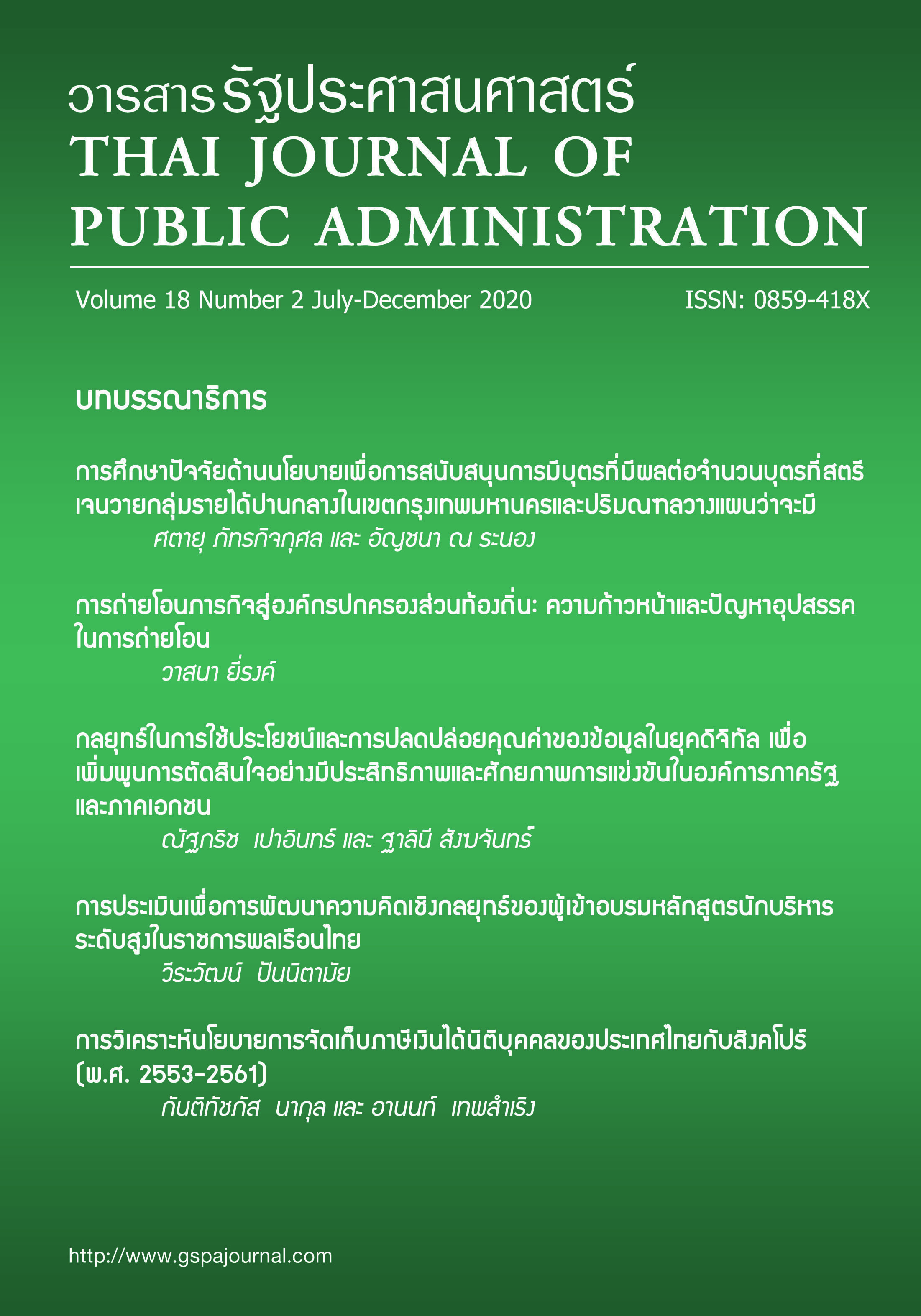Mission Transfer to Local Administrative Organization: Progress and Problems of Transferring Obstacles
Keywords:
The Local administrative organizations, Decentralization, Mission TransferAbstract
The purposes of this study were: 1) to investigate the progress of the mission transfer to local administrative organizations in accordance with the Determining Plans and Process of Decentralization Act No.1 (B.E.2542), No.2 (B.E.2551), and No.3 (being draft Act for B.E.2562-2565) 2) to analyze the problems and obstacles in transferring missions to local administrative organizations. The study was a qualitative research. Collecting data from relevant documents and in-dept interview from decentralized experts and executives were used as a research methodology.
The results showed that, due to the Determining Plans and Process of Decentralization Act No.1 and No.2, There are 6 aspects of mission must have been transferred to local administrative organizations. However, in term of progress, only a few aspects have already been performed including Art and Culture, Traditions, and Local Wisdom. On the contrary, Social Organization aspect and Peace and Order Maintaining aspect are the two aspects which have been partially and gradually transferred. In terms of the components that must be transferred in common with the mission including budget, personnel, and the amendment of laws found that there was not enough advancement and inconsistent with the mission. In addition, the research also found that the draft Act of the Determining Plans and Process of Decentralization Act (Act No.3) which aims to improve the scope and procedures from the Act No.1 and No.2, has identified 3 additional aspects of mission namely, infrastructure, social and economic and environmental. The said Act has been approved by the Decentralization to the Local Government Organization Committee at the meeting No.2/2019 dated on 29 May 2019. However, in accordance with the legal procedures, the Act is now under the consideration by the Office of the National Economic and Social Development Council and it will be proposed to the Council of Ministers Cabinet for approval and report to the Parliament before being announce in the Thai Government Gazette.
Considering the problems and obstacles, there were many sequencing issues. Firstly, the unclear decentralization policies which was cascaded to the regional government led to the lack of attention, thus the implementation was not complied with the Act. Secondly, most of local administrative organizations were lack of the readiness as well as the transfer process was not yet completed. Thirdly, budget and personnel transfer did not correspond to the transferred mission. Lastly, the relevant laws were still being revised.
To cope with the above issues, the government should give priority and declare the decentralization as a national agenda, empowering both of the central government and the regional government must be reduced simultaneously. Furthermore, the local administrative organizations must have been developed to be the major unit in providing public services. To reduce the duplication, all mission transfer must be clear. All previous problems must be defied as well as the resolutions must be indicated. Creating consistency between the transfer process, budgets and personnel. In order to truly achieve the goal of decentralization, providing new laws or law amendment is also needed. However, the said laws should be consistent with the transfer mission e.g. increasing independence, reducing control, and encouraging local administrative organizations to perform public services within the context and capability itself.
Based on the findings, it was recommended as follows; 1) the relationship between the state government and local administrative organizations should be rearranged 2) reduce control and promote the local administrative organizations to initiate their own operations under their potential and readiness 3) restructure the local administrative organizations by merging some small units together in order to save economies and increase sufficient potential. However, additional budgets may be allocated to create incentives for mergers and acquisitions. 4) restructure Office of the Decentralization to the Local Government Organization Committee and be promoted to the center unit of decentralization, while increase roles, duties, and authorities to the local administrative organization committee at provincial level. It is to act as a mentor to give advises, solve problems related to the transfer of budget and personnel, as well as to monitor, evaluate and report to Office of the Decentralization to the Local Government Organization Committee.



